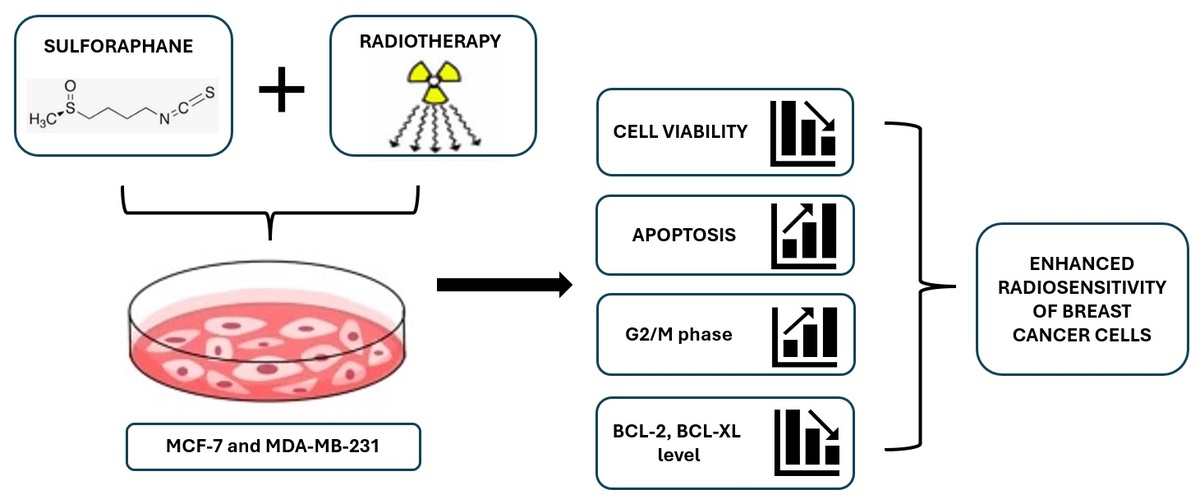Current issue
Archive
Manuscripts accepted
About the Journal
Editorial office
Editorial board
Section Editors
Abstracting and indexing
Subscription
Contact
Ethical standards and procedures
Most read articles
Instructions for authors
Article Processing Charge (APC)
Regulations of paying article processing charge (APC)
ONCOLOGY / RESEARCH PAPER
The Effectiveness of Sulforaphane in Radiosensitizing Breast Cancer Cells
1
Oncology Research Laboratory, Oncology Institute, Faculty of Medicine, Medical Academy Lithuanian University of Health Sciences, Kaunas, Lithuania
2
Oncology Research Laboratory, Oncology Institute, Faculty of Medicine, Medical Academy Lithuanian University of Health Sciences & Department of Genetics and Molecular Medicine, Faculty of Medicine, Medical Academy Lithuanian University of Health Sciences, Kaunas, Lithuania
3
Department of Oncology and Hematology, Hospital of Lithuanian University of Health Sciences; Kaunas University of Technology, Physics department, Kaunas, Lithuania
4
Department of Radiology, Faculty of Medicine, Medical Academy Lithuanian University of Health Sciences, Kaunas, Lithuania
5
Oncology Institute, Faculty of Medicine, Medical Academy, Lithuanian University of Health Sciences, Kaunas, Lithuania
Submission date: 2025-07-02
Final revision date: 2025-07-17
Acceptance date: 2025-07-17
Online publication date: 2025-07-26
Corresponding author
Danguole Laukaitiene
Oncology Research Laboratory, Oncology Institute, Faculty of Medicine, Medical Academy Lithuanian University of Health Sciences, Kaunas, Lithuania, Lithuania
Oncology Research Laboratory, Oncology Institute, Faculty of Medicine, Medical Academy Lithuanian University of Health Sciences, Kaunas, Lithuania, Lithuania
KEYWORDS
TOPICS
ABSTRACT
Introduction:
Radiotherapy is a vital therapeutic option in the treatment of breast cancer nowadays. However, a major obstacle to the full effectiveness of radiation therapy is still the radioresistance of cancer cells. Various studies have proven sulforaphane's (SFN) beneficial effects against cancer and its possible utilization as a radiosensitizer in radiotherapy. This study aimed to investigate whether SFN has a radiosensitizing effect on breast cancer cells.
Material and methods:
The anticancer efficiency of SFN and radiosensitizing effect in MCF-7 and MDA-MB-231 cell lines were assessed by the MTT assay. Using a flow cytometric assay, the apoptosis level and changes in the cell cycle were measured. RT-qPCR and Western blot analysis were used to determine BCL-2 and BCL-XL genes expresion and proteins level.
Results:
According to our results, SFN reduced the viability of cells, and combining SFN with radiation therapy (IR) caused much greater anticancer effects on cells. SFN+IR was shown to enhance the number of cells in the G2/M phase and the percentage of cells going through apoptosis. SFN reduced the expression of apoptosis-relative genes BCL-2 and BCL-XL. Consistent with this data, Western blot analysis revealed that BCL-2 and BCL-XL protein levels were decreased in tested cells. As a result of the combination treatment, the downregulation of the BCL-2 protein was observed only in MDA-MB-231 cells.
Conclusions:
These results indicate that SFN acts as a radiosensitizer by enhancing apoptotic cell death and reducing anti-apoptotic genes in breast cancer cells.
Radiotherapy is a vital therapeutic option in the treatment of breast cancer nowadays. However, a major obstacle to the full effectiveness of radiation therapy is still the radioresistance of cancer cells. Various studies have proven sulforaphane's (SFN) beneficial effects against cancer and its possible utilization as a radiosensitizer in radiotherapy. This study aimed to investigate whether SFN has a radiosensitizing effect on breast cancer cells.
Material and methods:
The anticancer efficiency of SFN and radiosensitizing effect in MCF-7 and MDA-MB-231 cell lines were assessed by the MTT assay. Using a flow cytometric assay, the apoptosis level and changes in the cell cycle were measured. RT-qPCR and Western blot analysis were used to determine BCL-2 and BCL-XL genes expresion and proteins level.
Results:
According to our results, SFN reduced the viability of cells, and combining SFN with radiation therapy (IR) caused much greater anticancer effects on cells. SFN+IR was shown to enhance the number of cells in the G2/M phase and the percentage of cells going through apoptosis. SFN reduced the expression of apoptosis-relative genes BCL-2 and BCL-XL. Consistent with this data, Western blot analysis revealed that BCL-2 and BCL-XL protein levels were decreased in tested cells. As a result of the combination treatment, the downregulation of the BCL-2 protein was observed only in MDA-MB-231 cells.
Conclusions:
These results indicate that SFN acts as a radiosensitizer by enhancing apoptotic cell death and reducing anti-apoptotic genes in breast cancer cells.
Share
RELATED ARTICLE
We process personal data collected when visiting the website. The function of obtaining information about users and their behavior is carried out by voluntarily entered information in forms and saving cookies in end devices. Data, including cookies, are used to provide services, improve the user experience and to analyze the traffic in accordance with the Privacy policy. Data are also collected and processed by Google Analytics tool (more).
You can change cookies settings in your browser. Restricted use of cookies in the browser configuration may affect some functionalities of the website.
You can change cookies settings in your browser. Restricted use of cookies in the browser configuration may affect some functionalities of the website.



